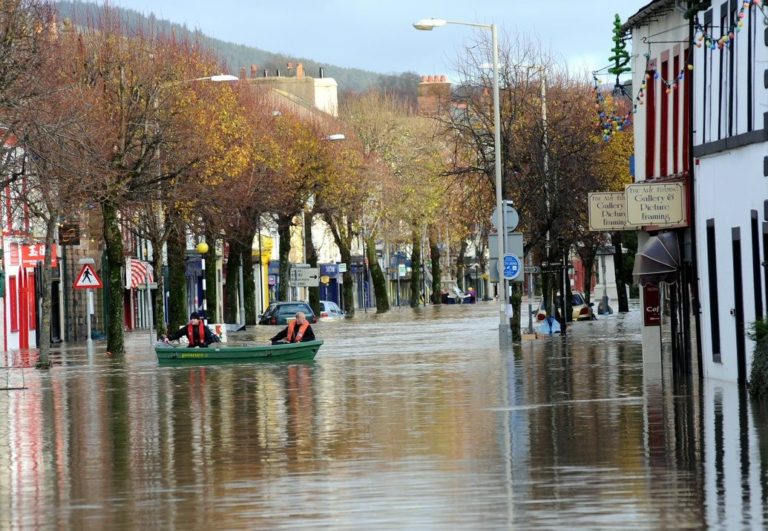
Judy Proctor is deputy director of radioactive substances and industry regulation for the Environment Agency. Judy’s teams support the delivery of protecting the environment through industrial regulation as part of the competent authority for Control of Major Accidents and Hazards (COMAH) and for the Environmental Permitting Regulations (EPR) in England.
Within this article, Judy discusses the implications of climate change and net- zero in the context of these regulatory frameworks including a consideration of climate change impacts on the Refinery and Fuels sector.
The risks associated with the effect of climate change on businesses are relevant whether businesses are regulated under EPR or COMAH, or both. The Environment Agency’s work in advising, supporting and regulating companies is set within the context of our five-year strategy, ‘EA2025’. This plan embeds sustainable development goals in all we do: namely, enhancing the quality of air, land, and water, to create a better place, within the government’s green growth and sustainable development agendas.
There is a fine balance between enhancing nature at the same time as supporting industrial activities that are vital to our economy, and our current strategy emphasises that there is ‘one big thing’ – the climate emergency – which impacts on everything we all do in this sense. This is why, throughout the strategy, our ambition is clear: we are helping create a net zero nation that is resilient to climate change.
All businesses need to adapt to a changing climate. And all businesses need to understand how mitigating climate change – transitioning to net zero emissions – will affect them, including the risk of accidents. It’s a game of two halves.
It’s not all about the new technologies
With industry and partners, the Environment Agency is thinking about the potential risks of net zero and the net zero transition. We chair the COMAH Strategic Forum net zero group – with the Tank Storage Association and others being an integral part. Some organisations may be feeding information into this group through trade associations, and we value the input from those who are already getting involved. Some businesses may be thinking that net zero is all about new technologies that aren’t relevant to their operations, but while the net zero enabling technologies are part of the challenge, they aren’t the whole story: managing existing and older assets through the transition is also part of the green industrial revolution, and it is important that these operations aren’t left behind.
“CLIMATE CHANGE WILL EXACERBATE ENVIRONMENTAL RISKS FOR REGULATED INDUSTRIES”
While existing good practice may be applicable for some of these challenges, there will be a need for new guidance, and new or updated good and best practice as well. Industry has an important role to play in helping to develop these, too. We are currently working on guidance relating to hydrogen-based technologies with other UK environmental regulators. Whether this guidance is for permitting or good practice
relating to major accident prevention, industry involvement is vital. We will all get to where we need to be much quicker through industry-wide collaboration.
Business as usual is not an option
But it’s not just about net zero or climate change mitigation that we should act upon. Adapting to a changing climate is the other side of the climate emergency. We are working hard on this topic, too. Last year the Environment Agency published its third adaptation report, ‘Living Better with a Changing Climate’, which outlines our adaptation approach under eight themes – and I would like to draw your attention to two of them.
The first one is thinking differently – “business as usual” is not an option. Climate impacts are inevitable, and our thinking must change faster than the climate. And second, we are helping businesses prepare – with flexible and climate-proof regulation and advice.
Climate change will exacerbate environmental risks for regulated industries. We are helping industries to manage these risks by providing advice and, where we have powers to do so, adjusting our regulatory permits to account for climate change. We will also support the development of more flexible regulatory approaches to accommodate rapid environmental change.
Climate change is influencing how we regulate today
In August we updated our EPR guidance on developing a management system to consider a changing climate. We also ended the screening process to produce a climate change risk assessment, for all new waste and installations permit applications. Now, new applications as well as all existing permit holders will need to include an assessment of risks and proposed mitigations resulting from climate change via their management systems. We will take a hazard- and risk-based approach to planning our regulatory activities, which will be co-ordinated across both EPR and COMAH regimes.
We have also published some sector examples, with specific vulnerabilities, on our website to help firms plan. For the Refinery and Fuels sector, we have outlined 34 separate impacts, ranging from flood risk, which is indeed a major and increasing threat – to the effects of rising temperatures.
Businesses are likely to understand more clearly how higher daily maximum temperatures can affect them after the record-breaking heatwaves we experienced this summer. Some examples seen in July include: a fire at a Lower Tier COMAH site involving a significant number of mobile containers; a refrigerant drum exploding; and various examples of overheating equipment leading to business interruption or interruption of monitoring or control equipment.
But it isn’t all bad news – some operators are embracing the challenge and adapting already. One site that last year saw the perishing and bursting of plastic compressed air hoses after long periods of exposure to direct sunlight, has now replaced all its plastic compressed air lines with either metal piping or plastic hosing with a high ultraviolet resistance rating.
Impacts don’t all relate to extreme weather requiring an emergency response, although many do. And businesses can often be affected by off-site effects, such as power supply or supply chain disruption.
Helping businesses prepare for climate change
There are many ways in which we are working with industry to help businesses to prepare for climate change. We are working with the Chemicals and Downstream Oil Industry Forum to identify best practice on climate change adaptation, which can help both industry and regulators across EPR and COMAH. Just like net zero, industry has an important role to play in identifying and developing good and best practice on climate change adaptation.
The challenge of uncertainty
The group has surveyed operators about climate impacts, and they have told us that extreme weather and other impacts threaten both business continuity and operational safety.
They also tell us that threats are managed or mitigated by a range of approaches, commonly site risk assessments, specific studies and plans, and emergency plans. They also say that managing uncertainty of future threats is the biggest challenge.
Recently published standards, like the ISO 14090 series, set out best practice for managing that uncertainty. These enable suitable and sufficient risk assessment and adaptation planning to ensure risks remain as low as reasonably practicable (ALARP). These processes will become increasingly important as we progress towards ever more frequent and extreme climate impacts.
Whatever challenges are faced by your operations, embracing them sooner will more likely enable your business to prosper in the future. To quote the Environment Agency’s former chair, Emma Howard Boyd: “our thinking needs to change faster than the climate”.
Things are moving at pace and at scale – but by working with industry and regulators, we will succeed in creating a net zero nation, resilient to climate change.

Judy Proctor works for the Environment Agency; an organisation that works to protect and improve the environment to make it a better place for people and wildlife in England. This includes reducing the impacts of flooding, promoting sustainable development and delivering environmental regulation.
She is the Deputy Director for Radioactive Substances & Industry Regulation. She has over twenty year’s operational and national experience in delivering environmental improvements. Many of these outcomes are delivered in partnership with partners, businesses, customers and government.
Judy is a parent trustee for Callywith College in Cornwall and champions the environment locally in her role for the Local Nature Partnership on the Integrated Territorial Investment Board for Cornwall and the Isles of Scilly.


